Joe Nawrozki: Legendary reporter succumbs to leukemia
Master Joe Nawrozki coaching his team before a martial arts tournament. (courtesy Emily Ciavolino)
The name Gene Fowler may be unfamiliar to most modern headline readers, but to aging journalists – real reporters from the era of paste pots, linotypes and beguiling ledes – Fowler is justly recognized as the quintessential newspaperman.
It is no surprise then that Joe Nawrozki was a fan of Gene Fowler. Both toiled for Hearst publications while earning the respect of colleagues at competing newspapers. And each enjoyed unabashed affection from those who knew them inside and outside of the industry. Nawrozki passed away late Saturday evening at his home in Bel Air, Maryland, a victim of Agent Orange induced leukemia. The former reporter, Vietnam veteran, martial arts master and founding member of Baltimore’s Aging Newspapermen’s Club was 70.
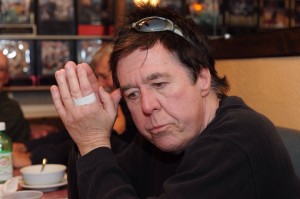
Nawrozki, who was born June 27, 1944, started his career in journalism at the Baltimore News American after graduating from Baltimore City College high school. He spent two months as a copy boy before becoming an apprentice sports reporter; honing his skill under the watchful eyes of the late dean of Baltimore sportswriters – John Steadman.
“I covered bowling and racing,” Nawrozki said in a January interview with the Baltimore Post-Examiner. “My first byline was earned covering a Russian International ping pong champion.”
Nawrozki laughed when he told this reporter, “I played against her, and then she played me.”
Nawrozki worked at the News American for three years before getting called-up in the draft. After his tour in Vietnam was over, he returned to the News American and remained there until that paper folded in 1986. He then spent two years in publications at a state college before joining the Baltimore Sun in 1988. Nawrozki worked at the Sun until taking an early buy-out in 2007. After retirement, Nawrozki turned his energies to numerous charitable projects, and to the teaching of the sport he loved – Taekwondo.
* * * * *
Last November, when Nawrozki announced at a literature reading that he had been diagnosed with leukemia, friends feared he would not make it past Christmas. His prognosis was grim, with doctors giving him less than three weeks to live. But for a while, the cancer went into remission, allowing Nawrozki ten more precious months. In that time, he continually encouraged all of those around him, while wryly winking at the grim reaper.
Seeking to honor him in life, a celebration was held last December at the social hall of Camp Wo-Me-To, a Baptist Bible camp in Jarrettsville, Maryland. More than one hundred members of Joe’s wide circle of family and friends attended the celebration, with a dozen or so sharing stories about a man many simply called Master Joe.
This reporter was present at that celebration. What follows are some of the tributes which were offered that night.
Nawrozki’s nephew, Jim Kelly, a lieutenant with the Baltimore City Police Department, remembered a day three decades ago when Uncle Joe took both he and his younger brother to The Block. “Needless to say, it was a day I will never forget.”
Kelly said his mother and father were understandably upset by the outing.
Nawrozki privately acknowledged to this reporter the innocent indiscretion, observing, “I came down a few notches in the eyes of my sister and brother in law for doing that, but there was really nothing to it. I did take the boys in to see the strippers, but I just wanted to introduce them to some real characters.”
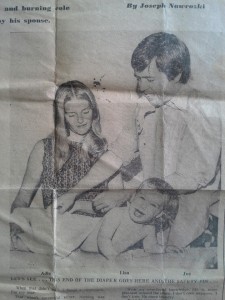
Fellow reporters Michael Olesker and Rafael Alvarez noted the impact Nawrozki had on their own careers. Alvarez acknowledged a deep and abiding friendship with Nawrozki based on a mutual love of Baltimore and the written word. And Olesker (who would team with Joe on some of the most important stories of the mid-1970’s) recalled meeting Nawrozki the day he returned to the News American from his service in Vietnam.
“Our sports editor, John Steadman, wrote a column with the banner, “Our G.I. Joe Has Come Home From The War.”
“When we stopped doing investigative reporting and were no longer hemmed in by “just the facts”, we wanted to be writers and really use the language. That had a great appeal for both of us. Joe had the soul of a poet. Dealing with veterans or with people on drugs, he was very attuned to the underdog and working class people. People he identified with. In that way, we were both products of Baltimore City College. We were touched by that melting pot.”
Retired Baltimore Sun reporter Robert A. Erlandson remembered the problems Nawrozki and Olesker created for the competition.
“We used to call them the Gold Dust Twins. They were constantly scooping us on stories. Finally, the Sun hired a hot-shot reporter at a huge salary to cover the same beat. It didn’t work out. Those guys simply had better sources.”
Nawrozki told the Baltimore Post-Examiner, “We worked weekends and holidays; it was tough on our families. We were on our own. We’d get tips and chase them down. There was a time the News American could afford to cut 2 reporters loose for 6 months or a year to do a story. The Sun tried to keep up with us, but they never could. Their guys didn’t have our sources, and sources are crucial. It takes a while to gain someone’s trust.”
Once Nawrozki eventually landed at the Baltimore Sun, he partnered with Bob Erlandson for the most frustrating story of their respective careers: the unsolved murder of a young teaching nun from the former Archbishop Keough High School (now Seton-Keough), named Sister Cathy.
“We just knew that the priest who was the main suspect was guilty of the murder. I only wish we could have somehow nailed him,” Erlandson said.
Nawrozki echoed Erlandson’s thoughts during our January interview, only adding, “I hope someday someone figures it out.”
* * * * *
Frank Ulmer, a student of Nawrozki’s who works at Camp Wo-Me-To, helped to organize the heart-moving testimonial. He was the first to share what turned out to be three of the longer tributes by Nawrozki’s martial arts students.
Ulmer opened by reading a poem, but the memories he shared were clearly off the cuff.
“Master Joe would meet with each of his students for a short lunch to discuss what’s going on, and leave 2-3 hours later. But during that time, we would get to know each other.”
“First, he would get to know more of who we are and where we come from, then Master Joe would tell us his own life stories. That would frame who he is and how he relates with others. His stories could be anything from growing up as a kid in Baltimore near Memorial stadium, running beers for the neighbors, or playing basketball on the local courts and getting chased out by the police. He loved going to dances and singing doo-whop. He also believed that his love of words and language was his escape from other bad influences in his life.”
Ulmer recalled that Joe talked about getting hired by the News American fresh out of high school and the power that came with a press card.
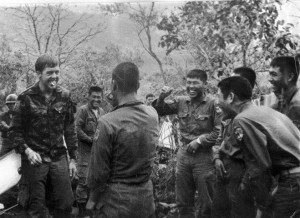
“He also told us stories of when he was in Vietnam and went through many harrowing times, as well as the bonds and friendships that were built there with Americans, Koreans, and Vietnamese. He told how they would take the extra supplies to a leper colony, so they wouldn’t be found and used by the Viet Cong.”
Ulmer also mentioned how Joe was treated when he returned from Vietnam.
“Here was someone who had served his country faithfully and was hated and spit upon (when he came back) by those he was there serving.”
Nawrozki reeled from that painful rejection but ultimately turned the hurt into helping others.
“Master Joe took a profound interest in all of his students, especially those he saw with physical or relational issues. He would do his best to help them find something in themselves that they did not know they had. And we saw many changes in those who would apply his lessons. Teaching Taekwondo also opened up many opportunities, like working with the students from the Maryland School for the Blind. He often said he truly believes he learned more from those students than they learned from him. He also poured out his life in service to others, volunteering as a mentor, and helping out at rescue missions.”
“I guess what it comes down to is Joe Nawrozki has, and is, living a full life that has always had purpose and meaning. Through service to family, country, friends and strangers, he has made an impact that will long outlast our lives.”
* * * * *
Jennifer P. Drumgoole, a school principal in Harford County, told of how Joe has encouraged her son Cole who now lives with his own debilitating disease.
“Ever since we can remember, Cole wanted to take martial arts. In early 2010, we saw that Jarrettsville Taekwondo was having an open-class day. We decided to take Cole, and from the minute he saw the class, he was hooked! We asked if Cole could join, even though he wasn’t quite seven. Master Joe looked at us and said, “Can he follow directions and listen?” We said, “Most of the time.” So, Master Joe said, “Let’s try and see what happens.” Well, what happened was Cole did a great job and moved quickly up the ladder. He was part of the tournament team and even won first place in a competition.”
“That sounds like a very simple story, but it’s not. What we didn’t know was that shortly after Cole started Taekwondo, he would become seriously ill.”
“Throughout the time that Cole has been sick, Master Joe has always been there. When his illness started progressing and Cole had to quit the tournament team, Master Joe supported him. When Cole needed to have surgery and wasn’t able to physically handle Taekwondo, Master Joe invited him to become a junior instructor so he could still participate. Cole had his final surgery in September and spent a week in the hospital. Master Joe came and spent an entire day with him. Not just an hour or two hours, but the entire day. One of the special things Master Joe did for Cole was to give him a pin that he had from his time in Korea. Cole has had that pin with him each time he’s had surgery. He says it’s his lucky charm and it is, because each surgery has been successful.”
“Master Joe saw something special in Cole when he first met him, and he has spent the past three years helping Cole grow into a confident young man. We can’t even begin to thank Master Joe for all the support he has given Cole and our entire family throughout Cole’s illness. Master Joe loves Cole and Cole loves Master Joe.”
“What we know for sure now is that Master Joe’s presence in Cole’s life has made an impact that will last a lifetime.”
* * * * *
Emily Ciavolino, an honors student at UMBC, was one of the last to pay tribute to her mentor, Joe. Ciavolino said she has been friends with Nawrozki since she was twelve.
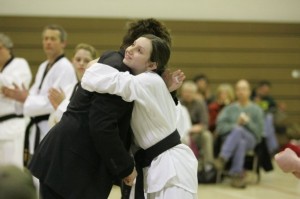
“I have been Master Joe’s student for about 7 years, and by job title, he was just my Taekwondo instructor, but in reality, he was so much more.”
“I was fighting my sister in class and she kicked my face. The side of my face was swollen and I was crying. Master Joe asked me if I wanted to keep fighting, and, trusting his judgement, I answered yes without hesitation. He just shook his head and said, “Sit down”. I really trusted him, and he didn’t let me down. He pushed me to my limit while also keeping my best interest in mind.”
“This quote, by William Arthur Ward, made me think of Master Joe:”
“‘The mediocre teacher tells. The good teacher explains. The superior teacher demonstrates. The great teacher inspires.’”
“The most important thing to know about Master Joe, is that everywhere he’s gone in his life, he’s really cared about people and connected to people. And he has been everywhere in his life, and changed so many lives. Master Joe has inspired me, been a friend to me, been a mentor, to me supported me, and so much more. If a great teacher just inspires, what can you call Master Joe?”
* * * * *
When he finally rose to speak, Nawrozki said, “This is one of the happiest days of my life. All of those who love me are here and visa-versa. I am really touched ” (Nawrozki would later tell this reporter the experience was, “Like getting punched one side to the other by emotion.”)
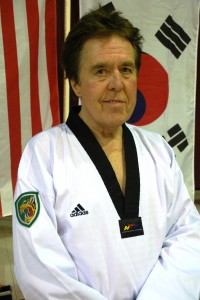
“I was ambushed by this (disease). My leukemia is both acute and aggressive. It’s caused by Benzine, the key chemical in Agent Orange. They still don’t know a lot about it – whether or not it can be passed to your family – and my daughter has asked me, ‘Will I get this, too?’ I try to stay on the railroad tracks and take it one day at a time. 500,000 Vietnamese have died from it. My brothers in Korea are fighting this too, but they’re not getting any help.”
Nawrozki told the hushed room how very fortunate he felt to be in a profession he truly loved. He said his favorite story as a reporter concerned a Maryland boy who had to be rescued from a mountainside in West Virginia. And he was immensely proud of the award he won for Best News Writing in 1984 from the American Society of Newspaper Writers.
“If I had to do all it again, I would.”
“I loved doing rewrites and getting out on the street. The hardest part of my job was doing phone interviews. I practiced hard at that. I learned to listen from James Michener and took writing cues from Gene Fowler.”
“Fowler looked at life as a great parade, and like him, I was in the parade of life. Not sitting on a lawn chair smoking a Pall Mall and watching the parade go by. I certainly hope my life counts for something, and when my time finally comes, you all get to watch Joey float heavenly and hopefully not in a southern direction.”
* * * * *
UPDATE
A memorial gathering has been scheduled for Saturday November 1, 2014 from 6 – 9pm at the church hall of St. Matthews Catholic church 5401 Loch Raven Blvd, Baltimore, Maryland 21239. Joe’s daughter Lisa stresses that this is not a religious service, but rather, a simple gathering where friends may reminisce about Joe. Coffee and deserts will follow.

Anthony C. Hayes is an actor, author, raconteur, rapscallion and bon vivant. A one-time newsboy for the Evening Sun and professional presence at the Washington Herald, Tony’s poetry, photography, humor, and prose have also been featured in Smile, Hon, You’re in Baltimore!, Destination Maryland, Magic Octopus Magazine, Los Angeles Post-Examiner, Voice of Baltimore, SmartCEO, Alvarez Fiction, and Tales of Blood and Roses. If you notice that his work has been purloined, please let him know. As the Good Book says, “Thou shalt not steal.”
